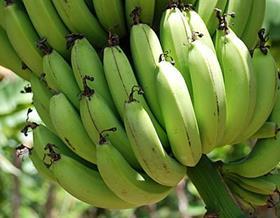
According to Professor Wilberforce Tushemereirwe of the National Banana Research Program in Uganda, 30 per cent of the country's banana harvest has been infected with Xanthomonas wilt (BXW), a disease capable of wiping out entire plantations in just 12 months.
The organisation sees genetic modification as the only way to tackle the problem, since conventional methods, including selectively breeding resistant strains, have failed to work, according to CNN International.
Trials have been underway since October last year, but GM crops remain illegal in Uganda, the world's second largest producer, and professor Tushemereirwe fears that local opposition to GM foods could jeopardise the project.
'Voices against the scientific approach we are employing are threatening the opportunity,' he said.
However, many have questioned whether the use of GM is to the benefit of poor farmers in Uganda.
'The question is whether this is the best technology to put money into in order to help poor countries and poor farmers,' the Soil Association's Peter Melchett told Fruitnet.com last year. 'A 2008 report completed by more than 400 scientists over four years and led by Professor Robert Watson found that GM did not have a role to play.'
The fear is that, with chemical and artificial inputs becoming more and more expensive, farmers in developing countries will become hooked on costly seeds and inputs.



